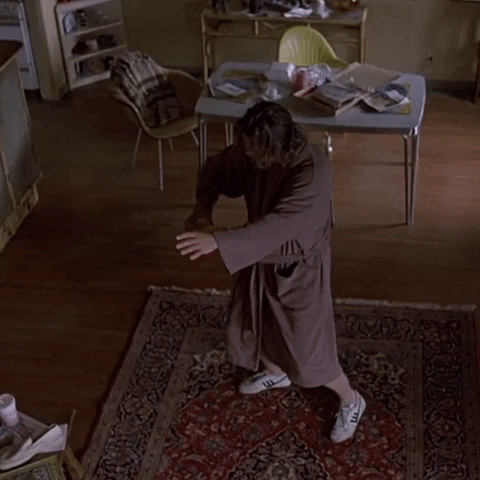Let’s just file this one under OKAY WOW and It Takes Two To Tango — and as far as we here in Speak to DaveLandia goes — everybody keep cool and nobody's gonna hurt anybody. We're just gonna be like a bunch of little Fonzies up in here.
— 👀 —
designer491
Originally published By Jake Offenhartz Jan. 24, 2020
One evening last month, Crown Heights resident Radu Dutzan lost his temper. For the third time since the summer, a construction crew was preparing to paint the stairs and hallway outside his studio apartment. During the previous two paint jobs, Dutzan said the fumes had seeped into his room, making it difficult to breathe. Of all the issues in the sprawling new Olmstead building, tenants said, the freshly painted hallway was the least of anyone's concerns.
Having previously tried, unsuccessfully, to politely appeal to the property manager, Dutzan, admittedly "riled up," dashed off a three sentence email to the landlord, which concluded: "'the walls DO NOT NEED PAINTING. STOP FUCKING AROUND WITH OUR MONEY.'"
A day later, he received a cease and desist notice. The letter informed him that his landlord, Harbor Group International, had retained the law firm Slochowsky & Slochowsky LLP in the matter of the mean email.
"Due to the extreme foul and vulgar nature of [the email], we are attaching the pertinent part of said email, rather than reiterate your inappropriate verbiage," it read. "Not only have you utilized such disgraceful language, but you go further by using CAPITALIZATION of your words to further animate your impropriety. Please be advised that such language shall not be further tolerated in any subsequent communications that you have with the landlord or it's [sic] staff."
If Dutzan dared use profane language again, either in writing or in person, the attorney would advise the landlord to "proceed with commencement of the appropriate legal action." (A spokesperson for Harbor Group declined to comment for this story, citing a pending legal matter.)
The response Dutzan received from his landlord's attorney one day later
Dutzan, a 29-year-old product developer from Chile, told Gothamist he was shocked and "intimidated" by the heavy-handed response. Adding to his frustration, he soon received an email from the property manager, Coney Realty Group, informing him that, due to his coarse language, the company would not be responding to his other concerns—about the lack of hot water, ventilation issues, and basic amenities that Dutzan claims were promised in the lease but still hadn't materialized two years later.
While Dutzan says he'd complained of such problems for months, the threat of a lawsuit was the first direct communication he'd received from Harbor Group. The Virginia-based real estate investment firm, which boasts of a $9.7 billion portfolio, purchased the building at 564-570 Saint John's Place this past summer. In exchange for a generous 421-a tax break, they're required to rent 20 percent of the units as "affordable," and the entire building is rent stabilized.
As Gothamist previously reported, Harbor Group has been accused of targeting its low-income tenants, allegedly refusing to properly remediate a mold-infested apartment for months on end. "Unfortunately, this incident appears to be part of a pattern," said Roy Germano, the founder of a newly-formed tenants union.
According to Ellen Davidson, a housing attorney at the Legal Aid Society, the cease and desist letter sent to Dutzan likely constitutes another form of harassment, with the goal of bullying a tenant into silence.
"That their reaction to a tenant's concerns about toxic fumes is to threaten to sue is outrageous," she said. "As they come in as a major property owner in New York, maybe they should understand the vernacular here before they threaten to sue people for using language they think is coarse."
Since all the units in Dutzan's building are rent-regulated, an attorney would have to prove he was a "nuisance tenant" before evicting him—a definition that includes illegal activity or creating a safety hazard. "Any housing attorney would laugh them out of court for this," Davidson noted.
Most New York City residents, however, aren't entitled to the same safeguards. Landlords in market-rate buildings can refuse to offer a lease extension for any reason they choose.
"A huge amount of tenants in New York City and New York State are not covered by rent regulations," Davidson told Gothamist. "Those tenants would have no rights in this situation. Landlords can [refuse to renew a lease] over tenants complaining, or because they don't like them, or because they rolled their eyes in a way the landlord didn't appreciate."




